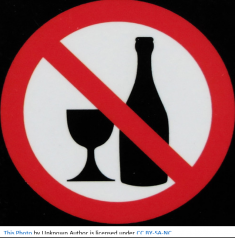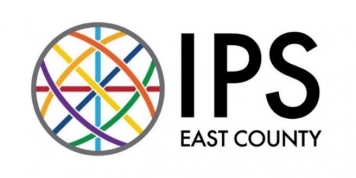By Seraphina Eberhardt, Program Manager, Institute for Public Strategies East County
February 17, 2025 (San Diego) -- The start of a new year often brings the promise of new beginnings. For many, that includes resolutions focused on personal health and well-being, from hitting the gym to adopting healthier eating habits. In recent years, however, more and more of us have embraced a different kind of New Year’s resolution: abstaining from alcohol for the month of January. This annual challenge, known as Dry January, has gained popularity, particularly among the “Sober Curious” movement, which seeks to explore the impact of alcohol on mental and physical health. In San Diego County, it’s more than just a passing trend. It's a growing cultural shift.
Dry January is a public health campaign encouraging individuals to refrain from consuming alcohol for the entire month. The idea is simple yet powerful. Give your body and mind a break after the holiday season’s overindulgence, reset your habits, and reflect on how alcohol affects your life. While it began in the UK as a grassroots initiative in 2013, the concept has spread rapidly worldwide, including the United States, where the movement has grown significantly in the past decade.
According to recent surveys, millions of Americans now participate in Dry January, and the statistics show that the practice has real, tangible benefits. A study from the University of Sussex revealed that over half of participants reported improved sleep, more energy, and even weight loss after a month of sobriety. Beyond the physical benefits, many participants also reported a greater sense of clarity and an overall improvement in mental health.
While Dry January has become a cultural phenomenon, it’s also part of a larger movement quietly taking root over the past several years. This trend is not about forced abstinence or a commitment to lifelong sobriety, but rather about exploring life without alcohol and questioning its role in social settings and personal well-being. It appeals to those who are curious about the impact of alcohol on their lives but don’t necessarily identify as alcoholics or intend to quit drinking forever. For many, the goal is to embrace a more mindful relationship with alcohol, whether that means cutting back, abstaining altogether, or just becoming more aware of their drinking habits.
The Sober Curious movement has been bolstered by an increase in alcohol-free social spaces, beverages, and online communities. In San Diego, a city known for its laid-back lifestyle and vibrant nightlife, there’s been a noticeable shift in the offerings available to those seeking an alcohol-free experience. Many local bars and cafes now offer creative non-alcoholic cocktails, and businesses like “Club Soda,” a local sober social club, provide spaces for people to enjoy social activities without the pressure to drink. These innovations highlight the growing demand for options that support a sober or sober-curious lifestyle, not just for January, but year-round.
The appeal of Dry January and the Sober Curious movement is not limited to big cities like Los Angeles or New York. In fact, San Diego County is a prime example of how this trend is taking off in a community that is often associated with a heavy drinking culture thanks to beach parties, craft breweries, and a year-round vacation mindset.
Recent data  from the County's Binge and Underage Drinking (BUDI) Initiative shows an increase in individuals who binge drink. The popularity of Dry January has become a gateway for those interested in taking the first steps toward more mindful drinking. It’s a low-pressure way to engage with sobriety and can be an effective tool for anyone looking to better understand their relationship with alcohol.
from the County's Binge and Underage Drinking (BUDI) Initiative shows an increase in individuals who binge drink. The popularity of Dry January has become a gateway for those interested in taking the first steps toward more mindful drinking. It’s a low-pressure way to engage with sobriety and can be an effective tool for anyone looking to better understand their relationship with alcohol.
In San Diego, the shift toward sobriety and mindful drinking is not only about individual health but also about community connection. Local organizations, like the San Diego Sober Meetup group, host a variety of alcohol-free social events, from hikes and yoga sessions to movie nights and happy hours. This growing sober community provides a supportive environment for people who may feel isolated in their journey toward sobriety or simply curious about a different way to socialize.
So, what’s driving this shift? For one, the growing body of research on the effects of alcohol on both physical and mental health is hard to ignore. Studies have linked alcohol consumption to a wide range of health issues, from liver disease and cancer to anxiety and depression. Many people, especially those in their 20s and 30s, are opting to take a break from drinking to lower their risks and improve their overall well-being.
In addition, the rise of social media has played a significant role in amplifying the Sober Curious movement. Platforms like Instagram and TikTok have given voice to individuals exploring life without alcohol, creating a sense of community and solidarity among people who might otherwise feel alienated by mainstream drinking culture.
Dry January’s effects can last well beyond the first month of the year. The rise of the Sober Curious movement is a testament to the growing interest in healthier, more mindful lifestyles. In San Diego County, where people constantly seek balance between the fun of coastal living and the realities of health and wellness, Dry January and the sober-curious culture represent an exciting new direction.
For those who took part in Dry January, the challenge may be just the beginning of a deeper, more reflective journey. Whether you decide to go alcohol-free, cut back, or simply make more mindful choices, the Sober Curious movement is here to stay. And in San Diego, it’s becoming more than just a trend. It’s a movement toward greater health, community, and awareness.
 IPS works alongside communities to build power, challenge systems of inequity, protect health, and improve quality of life. IPS has a vision for safe, secure, vibrant and healthy communities where everyone can thrive. To learn more about IPS East County, follow us on our social media platforms: IPS East County Facebook, IPS East County X, and East County Youth Coalition Instagram. Our website is at IPSEast.org. Resources and services are available to assist with screening, treatment, and recovery for individuals with a substance use disorder via the Access & Crisis line, which is open year-round, 24/7 at (888) 724-7240 or dial 988.
IPS works alongside communities to build power, challenge systems of inequity, protect health, and improve quality of life. IPS has a vision for safe, secure, vibrant and healthy communities where everyone can thrive. To learn more about IPS East County, follow us on our social media platforms: IPS East County Facebook, IPS East County X, and East County Youth Coalition Instagram. Our website is at IPSEast.org. Resources and services are available to assist with screening, treatment, and recovery for individuals with a substance use disorder via the Access & Crisis line, which is open year-round, 24/7 at (888) 724-7240 or dial 988.

